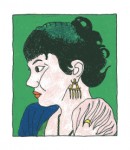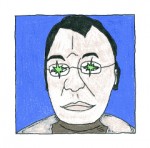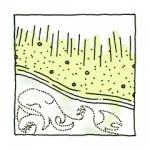Thu 22 Nov 2012
Love, Nightmare, Waking: Glamorous Freak by Roxanne Carter
Posted by laup under 5 Stars of the Magi, Abundant, Conversance, Disclaimer, Interesting, Meditations, Relevance, Review, Technique, The Book Mine, Transmutation, Weirdie
Comments Off on Love, Nightmare, Waking: Glamorous Freak by Roxanne Carter
 Traveling carnivals and liminal spaces; mix well to create a mystery ride.
Traveling carnivals and liminal spaces; mix well to create a mystery ride.
I played an amusement park game for kicks because I’m a sitting duck when it comes to the carnie pitch. Strangely enough, I won an emerald ticket to the mermaid tent and found myself reading a most curious book.
It is presented as a diary of impressions, with evocative photographs that offer a theme to each chapter. You are pulled along by the narrative and facedwith an organic labyrinth of the senses that rapidly disorients and alarms.
The reader and protagonist switch points of view; at times you are the voyeur, other times you are participant. How ghastly! The horror is imminent and personal. Denial or humor may dull the pain.
The only cure is to listen. Under the immediate tumult is the story of an anxious and compelling internal experience; a young woman discovering her shadow and the trauma of understanding her soul’s growth.
Dive into the depths and what you really have is the journey of Kore through the underworld. Plunge, hunt, rise. This is hard core stuff. People lose minds, innocence and teeth on journeys like these. Sometimes they don’t even leave a corpse.
To allow ourselves to feel for another is to open the door to terrible risk. Invasion by a vampire or a bluebeard are just one possibility. We might be swept away by divine brutality and carried off into an otherworld which is beyond human understanding.
It’s distressingly relevant today. Having an experience of the mermaid and the unredeemed passions of the underworld without being blasted to pieces is a serious human issue. All of us are in need of wizards who can show us what is in our being and how it is understood. Making more conscious choices might be the best tool we have.
The author is no slouch. She can craft a solid sentence and handle the whopper fish with the respect and skill for the inner ocean that makes it look easy. Her grasp of photography is stunning when you consider how much goes into the capture of a compelling image.
I had to dig around though; something told me this kung fu master had a few more concealed tricks in reserve. Multimedia competency and honed artistic talent are impressive accomplishments, but I felt I was missing some context.
To say the author knows her stuff is an understatement. Looking up photos from the book on her Flickr sets or watching the YouTube videos she’s posted, it gradually becomes clear to me she has a Leonardo’s Workshop thing going on. Master model of disguise, Doctor of creativity, Sage of academic standards, Ace crafter—I could go on, but I’m satisfied.
The book reaches me on a personal level because I’ve been through the underworld myself. Finding the other you is no mean feat. I have to admit I was afraid of where the book was going about half way through—finding one’s way to the center and out again often seems to me to be a rare moment in art. How exciting to see that I’m not alone!
The turbid darkness of it does make for some tough reading. Prose like this needs to be savored, and reexamined in order to extract the full meaning. In real life the labyrinth is a constant series of marking and re-marking of your path. I just don’t know if I could come back to this book; it’s that harrowing.
Indeed, the text itself indicates that the heroine hates aspects of the journey, that she wants it to be over with. Don’t I know it—preach sister! One ticket is enough for anyone, just like an everlasting gobstopper.
It’s too soon to tell with a work like this whether the text is built like that or whether there really is bounty. There are works of art that make a mark on you, and you don’t need to experience them again because they have served their purpose. Either way is valid, and worth whatever you paid for your psychic increase.
Remove the glamor and you have something most freakish: something ordinary and wholesome. Real food that feeds the soul and restores us to ourselves. Superbly well done.
5 out of 5 stars of the Magi.


